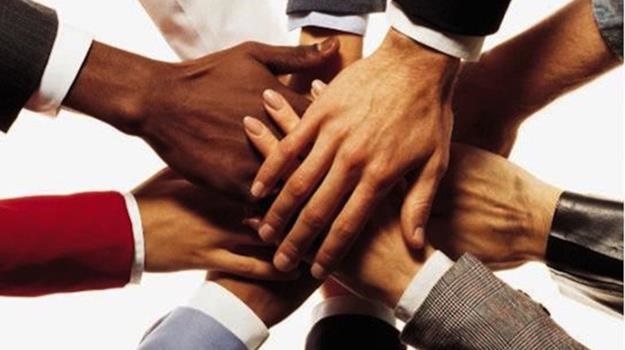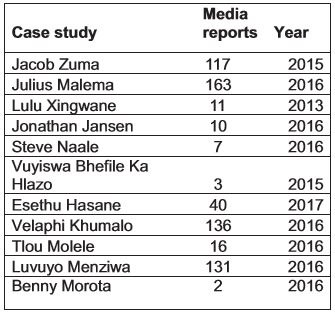
Trade union Solidarity released a report on April 4, showcasing “the selective way in which racism is being dealt with in South Africa”. Titled “Racism, hate speech and double standards: Not a simple black and white matter”, the report looks at individual cases of racism which have seen prominence within the social media and traditional media space over the last two years.
In its quest to find out whether or not racism is dealt with selectively in South Africa, Solidarity went about providing analysis towards case studies based on “black and white” groups of people who have publicly uttered racist comments. The comments were all made either via social media platforms like Facebook, or during public addresses.
“The profiles of the perpetrators, the contexts in which these comments are made, as well as the outcry, aftermath and punishment that followed these utterances are delineated and parsed,” the report says.
The “white group” of perpetrators in the report were:
•Kwa-Zulu Natal real-estate agent Penny Sparrow;
•Former Standard Bank economist Chris Hart;
•Durban resident Justin van Vuuren;
•High Court Judge Mabel Jansen;
•26-year-old jobless Capetonian Matthew Theunissen; and
•Durban estate agent Vicky Momberg.
The “black group” of perpetrators comprised of the following:
•President Jacob Zuma;
•EFF Student Command senior official Luvuyo Menziwa;
•Former minister for women, children and people with disabilities and also of agriculture and land affairs Lulu Xingwana;
•Economic Freedom Fighters leader Julius Malema;
•Senior official at the Oudtshoorn municipality Vuyiswa Bhefile ka Hlazo;
•Media and communications manager of the Department of Sport and Recreation Esethu Hasane;
•Sports promoter at the Gauteng Department of Sport, Arts, Culture and Recreation Velaphi Khumalo;
•Law lecturer at the University of South Africa Benny Morota;
•spokesperson for the Ngwathe local municipality (Parys) Steve Naale;
•Former vice-chancellor and rector of the University of the Free State Jonathan Jansen; and
•Former mathematics teacher at the Curro Northern Academy Tlou Molele.
According to Connie Mulder, head of Solidarity’s Research Institute (SRI), this report focuses specifically on those individuals who have recently made themselves guilty of racist slurs and the resultant hype each of those slurs caused in the traditional media and on social media. “In essence, the report is a comparative study done by examining several high profile cases as case studies and to examine how each of those was treated by the media and the South African Human Rights Commission (SAHRC),” Mulder explained.
Mulder also pointed out that the analysis of the results repeatedly showed an inconsistency and a certain selectivity by the the media with regards to slurs made by black people vs slurs made by white people. “According to our research, remarks by a person like Justin van Vuuren generated more media reports than Julius Malema’s ‘slaughter all whites’ remark,” Mulder said.
Based on the case studies which Solidarity used in its analysis, the union believes that “it is clear that racial discrimination in South Africa is a problem”.
“In those cases where the transgressor was white, media coverage was relatively extensive. The average number of media reports for the five white case studies was 1 286 per case study. This figure is skewed by the case of Penny Sparrow, which was responsible for 4 501 media reports on its own. Without Ms Sparrow, the average number of media reports is 643.6 per case study,” the report says.
When it came to black trangressors, the average media coverage fell way below this, with an average of 66.4 reports.
“Pronouncements by the president of South Africa, Jacob Zuma, as well as the leader of the EFF, Julius Malema, receive much more media coverage than people on lower levels. In 2016, there were 117 and 163 media reports, respectively, on racist pronouncements made by Julius Malema and Jacob Zuma,” the report states.
Solidarity argues that media coverage for people of influence such as Zuma or Jansen should in fact be more prominent than that of people who hold no influential positions such as Penny Sparrow, who was unknown before her racially-motivated outburst on Facebook.
In January 2016, Sparrow issued a racially motivated statement on her Facebook page, when she referred to black-beachgoers as “monkeys”.
“From now on I shall address the blacks of South Africa as monkeys as I see the cute little wild monkeys do the same, pick and drop litter,” she said in her Facebook post.
Sparrow was convicted of hate speech and ordered to pay R150 000 to the Oliver & Adelaide Tambo Foundation. The court then referred the matter to the National Prosecuting Authority (NPA) for a criminal prosecution. The Scottburgh Magistrate’s Court convicted her of crimen injuria and fined her R5 000 or 12 months imprisonment.
Solidarity argued that whilst punishment was meted out against Penny Sparrow and other white perpetrators of racism, the same cannot be said for black perpetrators.
Menziwa had also posted a defamatory and racially insulting statement to his Facebook page; ““F*** white people. Just get me a bazooka or AK-47 so I can do the right thing and kill these demon-possessed humans.”
“The university (of Pretoria) subsequently suspended Menziwa from the SRC pending an investigation by the student body. The university temporised with Menziwa’s case and several months later it is still not clear what his fate as a UP student is or whether he will be suspended,” the report said.
Solidarity also said it was unclear if anyone reported Menziwa to the SAHRC.
Solidarity has come out strongly against the commission, saying they were not fulfilling their role. “Clearly the commission is not following the guidelines to contain hate speech as set down by the UN’s Committee for the Elimination of All Forms of Racial Discrimination (CERD). Our research shows that the SAHRC takes steps against white lightweights but that they let the black heavyweights get away unscathed,” Mulder said.
In response to these allegations, the SAHRC told City Press that the commission does not classify complainants into categories such as “The White Group” or “The Black Group”.
“This reflects outmoded thinking that does not square up to the equality provisions of our Constitution, which is the primary document that determines the work of the SAHRC,” Gail Smith, spokesperson for the SAHRC said.
“It is unfortunate that Solidarity fundamentally fails to understand the concept of structural racism, which remains a reality in South Africa, and which significantly contributes to the ongoing inequality, which still manifests along racial lines,” Smith said.
Smith suggested that Solidarity should do more to understand the complexities of race and inequality which arise from South Africa’s history, and contributes to the daily violations of human rights across the country.
“South Africa is a participatory constitutional democracy, not a nanny state. The SAHRC is mandated by the Constitution to monitor, protect and educate on human rights, not police private social media platforms or function as a ‘Net Nanny’. Human Rights are our primary concern, as mandated by the Constitution. As such we have no obligation to engage in or legitimate Solidarity’s spurious discourses of ‘white lightweights and black heavyweights’,” Smith told City Press.
“Seeking to portray a sector of society, which continues to enjoy considerable social and economic privilege, as ‘victims’ based on superficial analyses of media reporting on incidents of racism on social media, is disingenuous. There are 56 million South Africans, only 12 million of whom are on Facebook. Social media is not, and cannot be, a reflection of race, racism, or racial inequality, in South Africa. The SAHRC is mandated by the Constitution to serve all in South Africa, irrespective of colour or creed, its 214 staff members do so daily and serve with a commitment and dedication to the fundamental principles of equality, dignity and respect for human rights of all,” Smith said.




 Publications
Publications
 Partners
Partners










